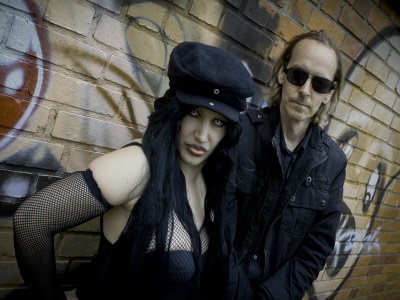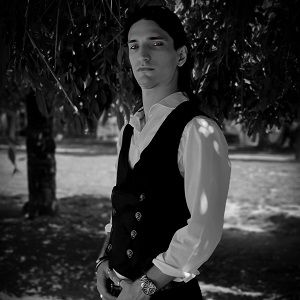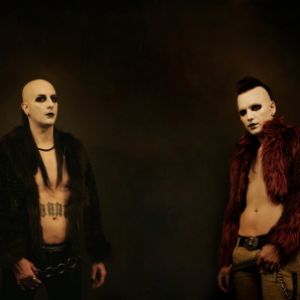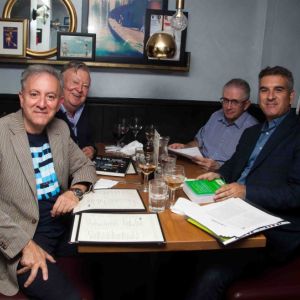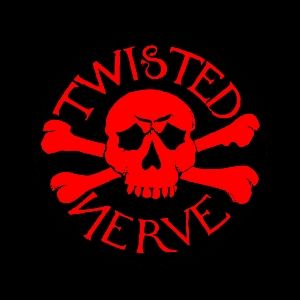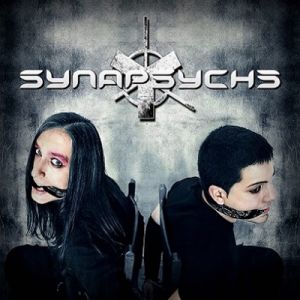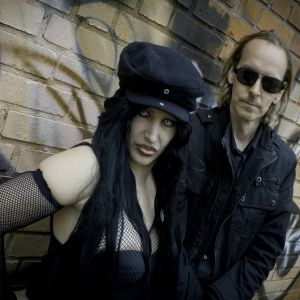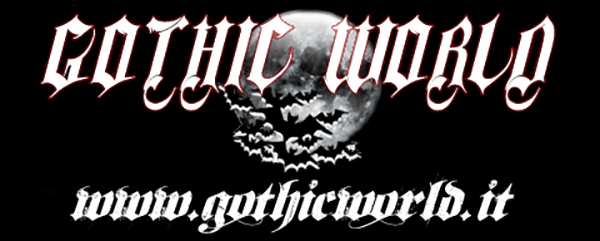Could you tell us more about the making of The Asgarda?
Ci potresti dire di più sulla realizzazione di The Asgarda?
Daniel: The Asgarda is our first record and we spent much time on it. It took us about three years to write the songs, recording and the final mastering / remixing process. We made all the recordings in our own studio ”Studio Outsiders”. In the end Andy Horn who cooperate much with Massacre Records wanted to make a full remix of the album. So, the writing and recording process were done about one year before the release and the last year we worked with Andy, Jan Yrlund who made the cover art and Massacre Records.
Daniel: The Asgarda è il nostro primo disco e per la realizzazione abbiamo impiegato molte energie. Tre anni per scrivere le canzoni, registrare e alla fine masterizzare. Abbiamo effettuato tutte le registrazioni presso il nostro studio ‘’Studio Outsiders’’. Alla fine, andy Horn che ha collaborato molto con la Massacre Records voleva effettuare un remix completo dell’album. Così, il processo di scrittura dei testi e della registrazione è stato effettuato all’incirca un anno prima dell’uscita dell’album, poi per l’anno rimanente abbiamo lavorato con Andy, Jan Yrlund che hanno realizzato la cover e infine la Massacre Records.
Lebanon - Sweden. How was this collaboration born?
Libano-Svezia. Com’è nata questa collaborazione?
Daniel: We are married and we got a family, so the collaboration of Madness of the Night started in our home. However, we had some project before and we meet over the net 1998 when I had my band Soulgrinder. Abir had some projects in Lebanon and she sent me a demo and I felt already that time I wanted to make something together with her.
Daniel: Ci siamo sposati e adesso abbiamo una famiglia, così la collaborazione dei Madness of The night è nata praticamente a casa nostra. Comunque, avevamo dei progetti anche prima, ci siamo incontrati sul web nel 1998 quando avevo la mia vecchia band, i Soulgrinder. Abir aveva dei progetti suoi in Libano e mi mandò una demo, mi sentii di dover iniziare una collaborazione con lei.
You play a particular music, but in Sweden, how is this kind of music scenario?
Suonate una musica davvero particolare, ma in Svezia, qual’è il panorama musicale in generale?
Daniel: It is not big in Sweden. There are some smaller clubs and enthusiasts people who make the scene alive. There are some bands, but not many of them we have good contact with. What we felt is that it is easier for us to promote and find audience outside Sweden. I think the gothic scene is not big but it is a global movement and if you count everything it is not small.
Daniel: Non è molto grande in Svezia. Ci sono solo pochi locali e seguaci che mantengono viva la scena. Ci sono molte bands, ma non molte con le quali abbiamo buoni contatti. Ciò che possiamo dire è che per noi è molto più facile suonare e trovare pubblico all’estero. Credo che la scena gotica non sia molto grande, ma in fondo è un movimento globale se tu metti tutto in conto, alla fine, non è poi così piccola.
Abir: Gothic rock is very tiny in Sweden maybe ten bands and mostly are male fronted vocal bands and I’m not Swedish just to come from middle east and put some foot there inside Sweden I hope I bring something in the history of Gothic rock that there is a woman from middleast who was a Gothrocker artist and brought something different. We have tried to promote outside Sweden most of the time. Hopefully the Gothic rock scene grows here in Sweden and Goths are treated better in the society here.
Abir: Il gothic rock in Svezia è un movimento molto ristretto. Ci saranno si e no dieci band in tutto il paese, di cui molte delle quali sono mal assortite, vocalmente parlando. Io non sono svedese ma mediorientale e spero di aver portato alla Svezia qualcosa di positivo e di diverso nella scena del gothic rock. Abbiamo provato a promuovere la nostra musica fuori dalla Svezia il più delle volte. La scena gotica qui si spera che cresca ancora, comunque i gotici sono trattati molto meglio nella società.
What are the artists you’re inspired by?
Quali sono gli artisti ai quali traete la vostra ispirazione?
Daniel: My inspiration comes much from the 80´s and 90´s gothic era. Bands like Sisters of Mercy, Fields of the Nephilim, Mission etc.. But also some influence of metal and punk rock.
Daniel: La mia ispirazione arriva dall’era gotica anni ’80 e ’90. Band come i Sisters of Mercy, Fields of the Nephilim, Mission etc. ma anche qualche influenza di metal e punk rock.
Abir: Sisters of Mercy, Dead Can Dance and Fairuz, Majida Alroumi and chinese opera.
Abir: Sisters of Mercy, Dead Can Dance and Fairuz, Majida Alroumi e il drama cinese.
The debut album represents a new beginning. What are the plans for the upcoming future?
l'album di debutto rappresenta un nuovo inizio. Quali sono i piani per il prossimo futuro ?
Daniel: We are not sure right now, but I guess we will work for a new album. But we think it is no need to rush to fast, we have to see what happens with The Asgarda, the response ect. We need to find inspiration to not do the same album again. We have made new songs, some of them goes in the same direction as The Asgarda, some are very different. I have also worked with some other songs for a side project. We are very proud of the final result of The Asgarda, and we will work for the same feeling with our next album.
Daniel: Non ne siamo ancora certi, ma credo che molto probabilmente lavoreremo ad un nuovo album. Tuttavia pensiamo che non ci sia bisogno di bruciarsi le tappe adesso, dobbiamo vedere che cosa accade con questo The Asgarda, la risposta del pubblico etc… abbiamo bisogno di trovare l’ispirazione per non ripeterci ma proporre qualcosa di diverso. Abbiamo elaborato nuovi brani, alcuni dei quali vanno nella stessa direzione di The Asgarda, alcuni sono molto diversi Ho anche lavorato su nuovi pezzi per un progetto parallelo. Siamo molto orgogliosi del risultato finale di The Asgarda, per il prossimo impiegheremo la stessa passione.
Could you explain much more about the lyrics?
Ci potete spiegare di più riguardo ai testi?
Abir: The lyrics are about a warrior journey in the east and west. She travels and through her eyes she writes what she sees songs about intolerance, oppression, society restrictions, feminism, domestic workers, racism, bullying against goths. There is a message in each song.
Abir: I testi sono ispirati a una giornata di guerra a ovest e ad est. Lei viaggia e con occhi da scrittrice scrive canzoni su ciò che la circonda, ovvero oppressione, intolleranza, proibizioni della società, femminismo, casalinghe, razzismo, bollismo contro I gotici. Questo è il messaggio di ogni canzone.
What do you think about the internet and world wide web rule into music world?
Che cosa pensate di internet e del ruolo del web nella musica?
Daniel: I think it is both good and bad. I guess it is harder today to sell records in the same time it is easier to buy music. It is easier to reach out to people at the same time there are more bands who wants to come out. Before the distribution where more controlled by big labels, today anyone can start sell music online. At the same time there are more junk out there so it’s harder to find what you’re searching for. I think it is such a kind of chaos but I do not say it is good or bad.
Daniel: Credo che siano entrambi buoni e cattivi. Credo che oggi sia difficile vendere dischi e allo stesso tempo più facile comprare musica. E’ più facile raggiungere le persone e allo stesso tempo ci sono sempre molte più band che vogliono debuttare. Prima la distribuzione era in mano a poche grosse etichette discografiche, adesso chiunque può vendere musica su internet online. C’è anche più robaccia in giro ed è più difficile trovare quello che cerchi di preciso. Credo che sia un gran caos, ma non so se tutto questo sia un bene o un male.
State of Madness, it's a particular song, which involves some metaphysical concepts, could you explain it better, as well?
State of Madness, è una canzone particolare che mi ha colpito, che include concetti metafisici e di forte significato spicologico. Lo potresti spiegare meglio?
Abir: State of Madness is a song about an Ethiopian maid who committed suicide after she was dragged by Lebanese men in the streets of Beirut. It is a song about racism and treatment of domestic workers and women in Lebanon.
Abir: State of Madness è una canzone che riguarda un’etiope matta che commette il suicidio dopo essere stata molestata da uomini libanesi nelle strade di Beirut. E’ una canzone sul razzismo e il trattamento delle casalinghe e delle donne in Libano.
Stand up is different, it's another part of this project and your sound.
Stand up è ancora diversa, sembra quasi un’altra parte del progetto e del suono.
Abir: Stand up was about the Arabic spring it was dedicated to the Syrian Revolution It is a song about "ALL DICTATORS IN THE MIDDLE EAST NOT ONE LESS OR MORE EVEN THE KINGS, MULLAHS, SHEIKS, POLITICIANS" It is a song about strength to stand and only revolt to bring change and good to the society.
Abir: Stand up parla della Primavera Araba ed è dedicate alla Rivoluzione Siriana. E’ una canzone su’’ TUTTI I DITTATORI DEL MEDIO ORIENTE NON SOLO I RE, I MULLAH, GLI SCEICCHI E I POLITICI’’. E’ una canzone che riguarda l’energia, la forza di alzarsi e ribellarsi ai regimi per portare cambiamenti e miglioramenti nella società.
Could you explain these differences in your music?
Ci puoi spiegare queste differenze?
Abir: It is all freedom of speech. I wrote what i saw. And through my vocals i hope i can change something through my contribution.
Abir: E’ tutta libertà di parola, ho scritto ciò che ho visto. E attraverso la mia voce spero di poter cambiare qualcosa attraverso questo mio contributo.
Theatre of life, do you think that life is a theatre, and people are actors?
Theatre of Life, credi che la vita sia un teatro e le persone attori?
Abir: Theatre of life is about life's struggle i wrote it in Lebanon in that period i felt so despair in life it was a war and i was prisoned in my room . I thought is life really worth, worth the pain. What is the meaning of life. What is the purpose of all. I started writing what is childhood what is moodhood what is an erection. And when all take off what they feel we are all prisoners in this theatre of life each one us is destined for something. Like me, for example, i was here to sing and others have roles in life. Even the sniper who murders people.
Abir: Theatre of Life è una canzone sulle avversità della vita, la scrissi in Libano, in un periodo in cui ero disperata, c’era la guerra e io mi sentivo prigioniera nella mia stanza. Credevo che la mia vita avesse un significato, così come ha vaolre la sofferenza. E’ questo il significato della vita. E’ questo lo scopo di tutto. Ho iniziato a scrivere su ciò che significa infanzia, su ciò che significa essere soffocati, che cos’è un’erezione. E quando ogni cosa svanisce, tutto ciò che provano è che siamo tutti prigionieri in questo teatro della vita, ognuno di noi è destinato a qualcosa. Come me, per esempio, che sono qui per cantare. Ognuno di noi ha un ruolo della vita. Come il cecchino che uccide la gente.
Through your lyrics, we see that you're inspired also by the literature. What do you think about the connection between various arts, as music, painting and poetry?
Attraverso i vostri testi, abbiamo notato che vi siete ispirati anche alla letteratura. Che cosa ne pensate dell’interconnesione tra le varie arti come musica, pittura e poesia?
Abir: We are inspired by freedom of speech mostly, yes there are convictions in life poetry mostly in Theatre Of Life but many of the inspirations are stories of real people from real life. There is a connection between arts, music, painting ofcourse it all based on the idea of freedom of speech and expression. The word is important like the poem, music and song.
Abir: Ci siamo ispirati molto alla libertà di parola, ma ci sono anche delle cose che riguardano la poesia nella canzone Theatre of Life, anche se molte di esse sono storie vere di persone realmente esistite. C’è una connessione tra le varie arti, musica, pittura, e certo tutto basato sulla libertà di idee ed espressione. La parola è importante come la poesia, la musica e le canzoni.
Voices of the People, what do you think about this globalization era, how is the feedback in Sweden?
Voices of The People, che cosa pensate di questa era postglobalizzata, com’è il feedback in Svezia?
Abir: Voices Of The People is actually about Jews and Arabs living together in tolerance and peace. We put a poster of a Jewish Arabic little small children friendship and we got 2000 dislikes from the middle east plus threats hate comments. But the song speaks about no flags, countries, backgrounds in building friendship, relationships on the human side not the color or where anyone comes from. The world was always one I do believe that religion, culture restrictions, oppression is why there are conflicts not the people themselves it is ideologies that controls people into hate, wars, violence Do i believe in globalization yes in a way but not a new world order like the politicians want it to be I believe in the Voice of the People that we are all one world. Feedback in Sweden is somehow restricted because there is a very anti immigrant voices in the society here not all but some who thinks anyone with an immigrant background is a thief or gangster. We had negative comments on Jävla Zigenare (Fucking Gypsy) a song about racism of Gipsies in Sweden. We are actually a band that writes about racism everywhere. We value freedom of speech very much And we try fairly to put our outcome on songs. All people are equal all what matters is music that connects people universal through their hearts, energy and selves
Abir: Voices of The People è una canzone sul vivere pacificamente tra arabi ed ebrei. Abbiamo inserito un poster di un bambino arabo e un bambino ebreo ed abbiamo riscosso dal medio oriente 2000 dislikes più molti commenti di odio. Ma la canzone parla del non avere bandiere, città, pregiudizi nel costruire amicizie, relazioni umane a prescindere dal colore, dalla razza o provenienza. Ma il mondo è sempre uno solo e credo che religione, restrizioni culturali, oppressione ci siano non perché le persone siano in conflitto tra loro, ma perché sono le ideologie che controllano gli individui in odio, guerra, razzismo. Credo nella globalizzazione, ma non come un nuovo ordine nel mondo, come vogliono farci credere i politici. Voices of The People credo che rappresenti il fatto che noi tutti facciamo parte di un unico mondo. Il feedback in Svezia è che in Svezia è qualcosa di limitato, ci sono voci anti immigrati nella società, non tutti, ma qualcuno che pensa che un immigrato sia per forza un ladro o un criminale. Abbiamo avuto critiche negative da Jävla Zigenare (Fucking Gypsy) per una canzone che parla di razzismo degli zingari in Svezia. Siamo attualmente un band che scrive canzoni sul razzismo che si trova ovunque. Prendiamo in considerazione la libertà di parola, e cerchiamo di introdurre nelle canzoni i nostri risultati. Tutte le persone sono uguali tra loro, ciò che importa è che la musica unisca le persone in maniera universale e univoca, unendo i cuori, loro stessi e infonda energia.
It's a new approach to play the gothic music, as well, but in the same time you maintain the same line of Sisters of Mercy or Dead can dance. Could you explain us this kind to write and compose music?
Si tratta di un nuovo approccio di suonare il gotico alla fine, anche se allo stesso tempo mantenete la stessa linea dei Sisters of Mercyo dei Dead Can Dance.
Abir: We are influenced by Dead Can Dance and Sisters Of Mercy but we try to be ourselves when we make music. We like to bring Gothic Rock into a new different way like politics, intolerance, racism, controversial subjects. Musically speaking we want every song to sound different.
Abir: Siamo influenzati molto dai Dead Can Dance, ma cerchiamo di essere noi stessi quando componiamo musica. ci piace portare nel nostro gothic rock tematiche come politca, intolleranza, razzismo, controversie. Musicalmente parlando vogliamo che ogni canzone sia diversa.
What are you plans for the upcoming future, what will we expect for this year?
Che cosa ci dobbiamo aspettare quest’anno?
Abir: We hope to play live if possible with a collaboration with another band, working and finishing another cd.
Abir: Speriamo di suonare live se possibile in collaborazione con un’altra band, lavorare e finire un altro cd.
Thanks for your attention
You welcome Ilaria have a great day! Ilaria
Grazie per la tua attenzione
Sei la benvenuta Ilaria, buona giornata! Ilaria




